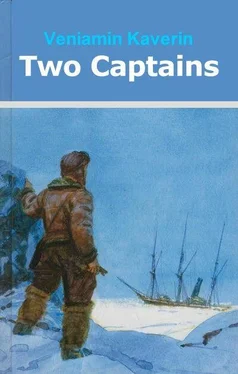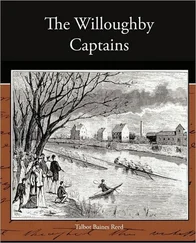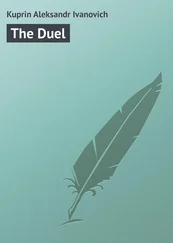Aunt Dasha read it hesitatingly, glancing at me over her spectacles with a schoolteacherish expression. I did not realise, listening to her, that within several years I would be making painful efforts to recall every word of this letter.
The letter was a long one, on seven or eight sheets-giving a detailed account of life on an icebound ship that was slowly drifting northwards. I was particularly amused to find out that there was ice even in the cabins and every morning it had to be hacked away with an axe.
I could recount in my own words how sailor Skachkov, while hunting a bear, had fallen to his death in a crevasse, or how everyone was worn out looking after sick engineer Tisse. But the only words I remember from the original were the few lines I have quoted here. Aunt Dasha went on with her reading and sighing, and shifting scenes rose before me as through a mist: white tents on white snow; panting dogs hauling sledges; a huge man, a giant in fur boots and a tall fur cap striding towards the sledges like a priest in a fur surplice.
Chapter Eleven
A TALK WITH PYOTR
It was while hunched over my "popindicular" strokes that the idea of running away first occurred to me. I had not been drawing those birds and clouds above the fence for nothing! Afterwards I forgot this idea. But with each passing day I found it harder to return home.
I saw very little of my mother. She left the house while I was still asleep. Sometimes, when I woke up in the night, I would see her at the table. White as chalk from fatigue, she was eating slowly, and even Scaramouch quailed a little when he met her dark scowling gaze.
I was very fond of my sister. Sometimes I wished I wasn't. I remember that beast Scaramouch beating her cruelly because she had spilt a wineglassful of vegetable oil. He sent her from the table, but I secretly brought her some potatoes. She wept bitterly while she ate, then suddenly reminded herself of the coloured glass beads which she feared she had lost when he was beating her. The beads were found. She laughed, finished her potato and started crying again.
I suppose autumn was drawing near, because Pyotr and I, strolling in Cathedral Gardens, were kicking up dead leaves with our bare feet. Pyotr was making up a story about the old excavation under the hillside being a tunnel that ran under the river to the opposite bank. He even claimed to have walked through it halfway.
"I walked all night," Pyotr said in a casual way. "Skeletons all over the place. Rats too."
From the hill we could see the Pokrovsky Monastery on the high bluff of the river-a white building surrounded by low walls, beyond which stretched meadows, now pale green, now yellow, changing colours in the wind like a sea.
"There are no rats in Turkestan," Pyotr added thoughtfully. "They have jumping rabbits there, and field rats out in the steppe. But they're different-they eat grass, like rabbits."
He often talked about Turkestan. According to him, it was a city where pears, apples and oranges grew right in the streets, so that you could pick as many as you liked and nobody would plug you with a charge of salt in your backside the way the watchmen did in our orchards. People there slept on carpets in the open air, as there was no winter there, and went about in oriental robes-no boots or overcoats for you.
"Turks live there. All armed to the teeth. Curved swords with silver trimmings, knives in their girdles and cartridge belts across their chests. Let's go there, eh?"
I decided that he was joking. But he wasn't. Paling slightly, he suddenly turned away and gazed at the distant bank, where an old fisherman of our acquaintance was dozing over his fishing rods, which were mounted in the shingle at the water's edge. We said nothing for awhile.
"What about your Dad? Will he let you go?"
"Catch me asking him! He's got other things on his mind."
"What things?"
"He's going to marry," Pyotr said with contempt.
I was astounded.
"Who?"
"Aunt Dasha."
"Tell me another one."
"He told her that if she didn't marry him he'd sell the house and go round the villages tinning pots and pans. She refused at first, then she consented. Must be in love, I suppose," Pyotr added contemptuously and spat.
I couldn't believe it. Aunt Dasha! Marrying old Skovorodnikov?
Pyotr scowled and changed the subject. Two years ago his mother had died, and he, sobbing, beside himself, had wandered out of the yard and off such a long way that they found him with difficulty. I remembered how the boys used to tease him about it.
We talked a little more, then lay down on our backs with outspread arms and stared up into the sky. Pyotr said that if you lay like that for twenty minutes without blinking you could see the stars and the moon in broad daylight. So there we were, lying and gazing. The sky was clear and spacious: somewhere high up the clouds were chasing each other. My eyes had filled with tears, but I was trying with all my might not to blink. There was no sign of any moon, and as for the stars I guessed at once that Pyotr was fibbing.
Somewhere a motor started throbbing. I thought at first that it was an army truck revving at the wharf (the wharf was below us, under the ramparts). But the sound drew nearer. "It's an aeroplane," Pyotr said.
It was lit up by the sun, a grey shape resembling a beautiful winged fish. The clouds advanced towards it; it was flying against the wind. I was amazed to see how easily it avoided the clouds. Now it was already beyond the Pokrovsky Monastery, and a black cross-shaped shadow ran after it over the meadows on the other side of the river. Long after it had disappeared I fancied I could still see its tiny grey wings way out in the distance.
Chapter Twelve
SCARAMOUCH JOINS THE DEATH BATTALION
Pyotr had an uncle in Moscow and our entire plan was built upon this uncle of his. The uncle worked on the railway-Pyotr would have me believe as engine-driver, but I suspected as fireman. At any rate, Pyotr had always called him a fireman. Five years before this engine-driver-cum-fireman had worked on Moscow-Tashkent trains. I am so exact about those five years because there had been no letters from this uncle now for five years. But Pyotr said this did not signify, because his uncle had always written very rarely; he was sure that he was still working on the same trains, all the more so since his last letter had come from Samara. We looked at the map together and found that Samara did indeed lie between Moscow and Tashkent.
In short, all we had to do was to find this uncle. Pyotr knew his address, but even if he didn't, one could always find a man by his name. We did not have the slightest doubt about the name-it was Skovorodnikov, the same as Pyotr's.
We envisaged the second stage of our journey as a simple matter of Pyotr's uncle taking us from Moscow to Tashkent on his locomotive. But how were we to get to Moscow?
Pyotr did not try to persuade me. He listened stony faced to my timid objections. He did not answer me: all was clear to him. The only thing clear to me was that but for Scaramouch I would not be going anywhere. And suddenly it turned out that Scaramouch himself was going away. He was going and I was staying.
It was a memorable day. He turned up in army uniform, in brand-new, shiny, squeaky boots, his cap tilted to one side and a cowlick of curls protruding from under it, and placed two hundred rubles on the table.
In those days this was an unheard of sum of money and Mother covered it with her hands in an involuntary gesture of greed.
But it was not the money that staggered me and Pyotr and all the boys in our yard-oh, no! It was a different thing altogether. On the sleeve of his army tunic were embroidered a skull and crossbones. My stepfather had joined a Death Battalion.
Читать дальше












